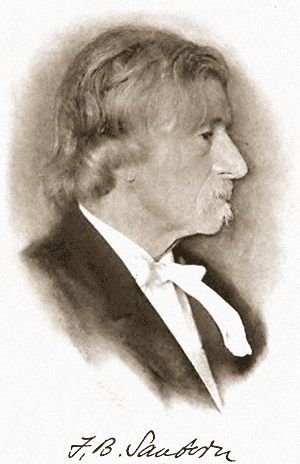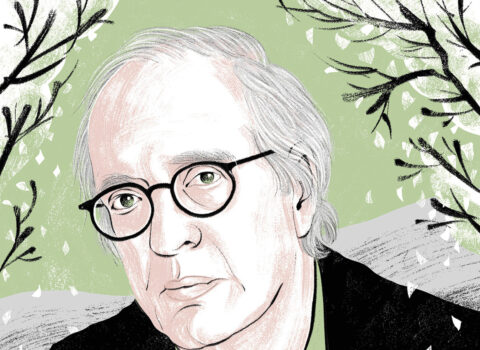 Today’s weekend read was unearthed after hours of ardent keystrokes not my own–a friend has been researching a book and went to look, using the Advanced Book Search feature of Google Books (by which one can search for words or phrases in all the books they’ve digitized so far), for something in Plato. What my friend got had nothing to do with Plato, much less the phrase he sought, but was nonetheless so good he shared it with me, as I now must with you.
Today’s weekend read was unearthed after hours of ardent keystrokes not my own–a friend has been researching a book and went to look, using the Advanced Book Search feature of Google Books (by which one can search for words or phrases in all the books they’ve digitized so far), for something in Plato. What my friend got had nothing to do with Plato, much less the phrase he sought, but was nonetheless so good he shared it with me, as I now must with you.
The few pages I mean are in a memoir called Recollections of Seventy Years by Franklin Benjamin Sanborn (December 15, 1831–February 24, 1917). Sanborn was an American journalist with a soft spot for Transcendentalists, authoring books on Thoreau, Emerson, and Hawthorne.
Harper’s editor William Dean Howells reviewed Sanborn’s memoir upon its appearance in 1909, and his review is worth a read (full text available), but the passage from the Sanborn that I suggest you enjoy first is on Emerson’s spontaneous verbal gifts. The pages are Emerson’s table-talk, as recorded by Samuel H. Emery, whom Sanborn describes as “[a] disciple of the semi-Hegelian school of speculation,” and who recorded Emerson’s remarks over the course of one evening of socializing.
Herewith, via Google Books, are pages 490–495 of Volume 2 of Sanborn’s Recollections of Seventy Years, quoting Emery.
My acquaintance with Emerson began in the fall or winter of 1866, when he came to Quincy to deliver a lecture at the invitation of the “Encore Club,” of which I was President. I was at that time living with my father, Rev. S. H. Emery, who was an Orthodox Congregational minister and pastor of a Quincy church. He very cordially assented to my desire to invite Mr. Emerson to take supper with us and Mr. Emerson graciously accepted our invitation. My father asked Mr. Emerson to say Grace (quite to my horror), but Mr. Emerson immediately responded, as I have noted elsewhere.
I have never forgotten some of the incidents of the lecture. A traveling doctor (one Dr. O’Leary) had engaged the hall subsequently to our engagement for the Emerson lecture, for a two weeks’ course, and on account of our previous engagement was obliged to suspend for one evening. He had some cheap paintings, evidently reproductions from photographs, of a number of important persons and among others, of Emerson. As his lectures were free and of a popular sort, the hall was crowded every night with a class of auditors, who for the most part, had probably never heard of Emerson; but Dr. O’Leary the night previous to the one on which Emerson was to lecture, paid Mr. Emerson such high compliments and so urged the attendance of his audience at the lecture of next evening, that to our very great surprise there was hardly standing room left. The doctor had improvised a raised platform at the other end of the hall from the regular stage and Mr. Emerson spoke from this platform, which consisted mainly of loose boards, and Emerson’s form of emphasis, by raising himself on his toes and settling back, resulted in unusual commotion. My remembrance is that the subject was “Immortality.”
After the lecture I went with Mr. Emerson to his room at the hotel, where he talked delightfully as long as I dared to stay.
The apothems which I enclose are what I could remember and jot down next day of his sayings that evening.
I asked him for his autograph and he wrote:
So near is grandeur to our dust—
So nigh is God to man,
When duty whispers low thou must
The youth replies I can.
I was familiar with his writings before this meeting and I respected him as a teacher, but my very great admiration and respect for him personally began then and have gained in strength ever since.
He came once more to Quincy to lecture, on my invitation, and this time he was accompanied by Miss Ellen.
In 1879 I went to Concord and resided there until 1887. During the early years of my residence I met Emerson frequently, and he was uniformly courteous, as was his wont to all men.
One of the very pleasantest things ever said to me was said by Emerson when I met him one morning near the little school-house then at the corner of Main Street near the Fitchburg station:
“It was a good compliment to this town, your coming here to live.”
The last time he read one of his lectures to an audience was at a meeting at my home in the Chamberlaine house, before my own house was completed. I sat by his side while he read and shall never forget my enjoyment of that evening. Mr. Emerson prefaced his sentence as to what the Soul says to Death by relating this incident:
“The lady who afterward married Charles Sumner was at the time of the War of the Rebellion a very ardent supporter of the North, and soon after the attack on Sumter, she met on a Boston street an acquaintance who favored a compromise with the South. As they met, the gentleman addressed her cordially, holding out his hand for the customary greeting, whereupon the lady drew herself up proudly and said, ‘I don’t know you, Sir.'” That, said Mr. Emerson, is what the Soul says unto Death—”I don’t know you, Sir.”
I have said often, and am glad to repeat, that he was the finest gentleman I ever met. Just to meet him on the street and receive from him the simplest greeting was an inspiration never to be forgotten.
Sayings of Emerson at Quincy.
Mr. Emerson’s Grace at our house in 1866:
“Spirit of all good, we invoke thy blessing.”Are we as near to God as we ever shall be?
Yes—Potentially—that is—it is in our power to be.Illuminees are more commonly found among women than men.
I call Bronson Alcott my test of minds. Carlyle with his English butcher-prejudice, or an affectation of it, calls him a “potato maniac” ; for Alcott is what is sometimes called a vegetarian—that is, he does not willingly eat meat.
The Good Spirit never ante-dates. He never gives us to-day what we shall need to-morrow.
The one Evil of the world is Blockheads, and wise men save it; without wise men the world would long ago have been bankrupt.
The Secret of Hegel is a rugged book—if one wants to practice intellectual gymnastics—cultivate intellectual muscle—let him read it if he has power and leisure to master it.
It is the rule that nations and races advance only by contact with other nations and races.
Agassiz is a Darwinian, notwithstanding that petulant, childish remark of his, totally unworthy of the man, with which he concluded a speech in Boston the other day—”We are not children of monkeys, but are children of God.”
When we look around upon the achievements of such souls as LaPlace and Newton, it seems to us that all which is in God is possible for us; we can make ourselves Archangels.
The simplest faith is the best. Socrates says—”The Daimon does not tell me what to do, but when I would do what I should not, the Daimon warns me.”
Soul creates body forever. Swedenborg was a good prophet and seer; he says, “I saw in Heaven streets and gardens, houses and stores and beautiful forms.”
Insanity is a safeguard (Swedenborg thinks); when by circumstances or even by the will, the pressure upon the soul is too great, the soul protects itself by insanity, which is a shield against undue pressure.
I believe in the Aesculapian theory, in the wonderful recuperative power of the soul. Agassiz will show you a lizard whose leg you can pluck off, or whose eye you may destroy and the little creature will replace them. This power of the lizard seems greater than that given to man in some directions : yet I believe the soul will in time cure any malady.
When Wendell Phillips delivers his learned lecture, The Lost Arts, it is a sort of irony. He says “If you will not let me speak about the events of to-day—the living things, a part of which I am—I will take you back 2000 years and more.”
It would be dangerous for us to say, ” All souls are immortal.” The soul may commit suicide, evil doing is death, and souls that do evil are dead.
Tis well to die if there be Gods,
Tis sad to live if there be none,
said Marcus Aurelius.
These sayings of a single evening’s conversation, like those reported by C. J. Woodbury at Williams College, indicate how Emerson’s daily talk overflowed with thought. Though he wrote with care, and printed only after long consideration, Emerson was the readiest and most instructive talker, though never pressing forward into the place of pontiff. I read these pages in the Hillside Chapel, and they were novel to most of those present, although many of us had heard Emerson talk for years.





